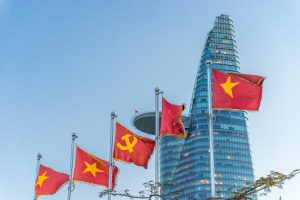Vietnam’s parliament has selected army general Luong Cuong as president, replacing To Lam, the chief of the Communist Party of Vietnam (CPV), and strengthening the Party’s norm of collective leadership after a period of unusual political flux.
In a session yesterday, the National Assembly voted unanimously for Cuong to take over the presidency from Lam, making him the sixth person to hold the presidency in as many years, and the fourth since early 2023. Cuong, 67, is a standing member of the CPV Secretariat and former director of the political department in the People’s Army of Vietnam.
In an acceptance speech, the general said that he was “moved, honored and fully aware of my great responsibilities ahead of the party, the state and the people,” according to a report by Bloomberg.
Cuong recalled how he joined the army in 1975, the year that South Vietnam fell to the communists. He wanted to “unify the country and only hoped that on the day of victory, I would return alive and happy, absolutely not thinking or dreaming of reaching this level or that position,” he told the assembled delegates, Nikkei Asia reported.
Cuong said that as president, he would continue to diversify Vietnam’s international relations while “strengthening national defense and security,” and building a “socialist” and “rich” nation. He also offered his “sincere respect and infinite gratitude” to Ho Chi Minh and pledged to stay “absolutely loyal to the party, the fatherland, and the people.”
The appointment of Cuong is hardly a surprise; indeed, it was widely predicted by Vietnam watchers. Alex Vuving of the Daniel K. Inouye Asia-Pacific Center for Security Studies noted on X today that the decision to appoint Cuong was likely made “nearly three months ago.” The delay in announcing the appointment allowed Lam to attend the U.N. General Assembly in New York last month, during which he also met with U.S. President Joe Biden, he argued.
His promotion brings to an end the anomalous period in which Lam has held two of the “four pillars” of the Vietnamese political system – CPV chief, president, prime minister, and chairperson of the National Assembly – and ends speculation that Lam would seek to hold the two positions until the next CPV National Congress in 2026.
The appointment thus seems to mark an end to a period of political churn that has seen a nearly unprecedented number of changes at the upper echelons of Vietnamese politics. This was due both to the scything anti-corruption campaign, initiated by the late party chief Nguyen Phu Trong, and the personal rivalries with which it was entwined – particularly, the race to succeed Trong as leader of the CPV.
Cuong’s two immediate predecessors, Vo Van Thuong and Nguyen Xuan Phuc, were forced to resign for “violations” related to the anti-corruption campaign. Lam, who as public security minister led the implementation of the anti-graft campaign, then inherited the presidency in May, two months after Thuong’s resignation. He was elected party chief in early August after Trong’s death, and is serving the remainder of Trong’s third term, which ends in early 2026. The next National Congress will then select a new general secretary who will serve until 2031.
Cuong’s ascent strengthens the concentration of security forces in the upper echelons of the party and state. Of the figures occupying the “four pillars,” three have a security background: Prime Minister Pham Minh Chinh and To Lam from the internal security forces, and Cuong from the military. Six of the 15 members of the CPV Politburo, the country’s top decision-making body, also hail from the security forces, including the recently appointed Luong Tam Quang, Lam’s successor as minister of public security.
The appointment of a military general as president has seemingly established a balance of power between two wings of the security establishment, which will stabilize Vietnamese politics, at least for the time being. But the dust will unlikely be settled before personal and factional maneuvering will begin in anticipation of the next CPV National Congress.

































